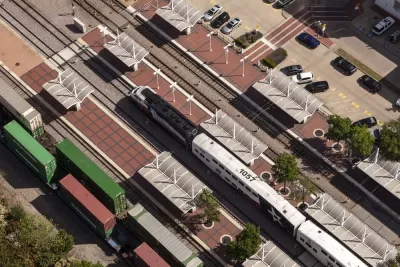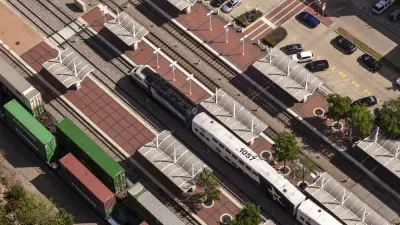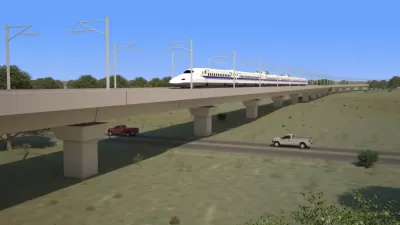Opposition to the Dallas-to-Houston private Texas Central high-speed rail line has gotten more serious with the creation of a defense fund to assist property owners in protecting their property rights. Texas Central plans to break ground next year.

"The organization, Texans Against High-Speed Rail, is dedicated to fight against Texas Central and their efforts of bringing the train to Texas," reports Vagney Bradley for Your Houston News. "One of the main concerns about the train is eminent domain."
"[T]he leadership of Texans Against High-Speed Rail has created a special litigation partnership with Dallas law firm, The Beckham Group, as well as formed a new Texas nonprofit corporation named TAHSR Land Defense Fund," according to the Jewett-based organization's press release on Feb. 2. The group "will champion the private property right of Texans by focusing his litigation efforts on stopping the project to protect landowners whose property would be devastated by this unwarranted project."
In March, the defense fund filed a lawsuit on behalf of a Leon County resident against a Texas Central affiliate "to challenge an exceptionally broad 'survey permission form' that landowners along the proposed route of the Dallas Houston High Speed Rail (HSR) are being asked to sign," according to the Tomball-based Tribune News.
Public subsidies?
Another issue that concerns rail opponents is what they perceive to be the likely need for public subsidy.
"Even though the high-speed rail is a private project by a private company, the organization against the train believes that the project will not stay private," writes Bradley.
“The primary thing they need to think about is the inevitable tax payer subsidies," said Kyle Workman, volunteer for Texans Against High-Speed Rail. "Another fact that we know is that no public infrastructure project greater than one billion dollars has ever been built with private money."
"Texas Central is paying for engineering studies with $75 million from Texas investors, $40 million from a state-backed Japanese development fund and about $130 million in design work from two firms," reported Robin Respaut for Reuters on May 5. "The Dallas-to-Houston rail line is projected to cost $12 billion and be completed by 2021."
While the company has "left open" the possibility of using U.S. Department of Transportation private-activity bonds, reported Eric Nicholson of the Dallas Observer on Aug. 11, 2015, that would not be unusual for a private company. "All Aboard Florida, the country’s first privately owned, operated and maintained passenger rail service," according to its website, applied for $1.75 billion in these tax-exempt bonds. The Miami-to-Orlando, 125 mph "higher-speed rail" known as Brightline is expected to begin Miami-to-West Palm Beach service to next year.
"Texans Against High-Speed Rail does not plan on backing down in their efforts to stop the creation of the bullet train," adds Bradley. "The organization against the high-speed rail project does not believe that Texas Central will be able to break ground on the bullet train at the end of next year."
Hat tip to AASHTO Daily Journal Update.
FULL STORY: Some Texans fighting against multi-billion dollar bullet train

Alabama: Trump Terminates Settlements for Black Communities Harmed By Raw Sewage
Trump deemed the landmark civil rights agreement “illegal DEI and environmental justice policy.”

Study: Maui’s Plan to Convert Vacation Rentals to Long-Term Housing Could Cause Nearly $1 Billion Economic Loss
The plan would reduce visitor accommodation by 25% resulting in 1,900 jobs lost.

Why Should We Subsidize Public Transportation?
Many public transit agencies face financial stress due to rising costs, declining fare revenue, and declining subsidies. Transit advocates must provide a strong business case for increasing public transit funding.

Paris Bike Boom Leads to Steep Drop in Air Pollution
The French city’s air quality has improved dramatically in the past 20 years, coinciding with a growth in cycling.

Why Housing Costs More to Build in California Than in Texas
Hard costs like labor and materials combined with ‘soft’ costs such as permitting make building in the San Francisco Bay Area almost three times as costly as in Texas cities.

San Diego County Sees a Rise in Urban Coyotes
San Diego County experiences a rise in urban coyotes, as sightings become prevalent throughout its urban neighbourhoods and surrounding areas.
Urban Design for Planners 1: Software Tools
This six-course series explores essential urban design concepts using open source software and equips planners with the tools they need to participate fully in the urban design process.
Planning for Universal Design
Learn the tools for implementing Universal Design in planning regulations.
Smith Gee Studio
Alamo Area Metropolitan Planning Organization
City of Santa Clarita
Institute for Housing and Urban Development Studies (IHS)
City of Grandview
Harvard GSD Executive Education
Toledo-Lucas County Plan Commissions
Salt Lake City
NYU Wagner Graduate School of Public Service





























